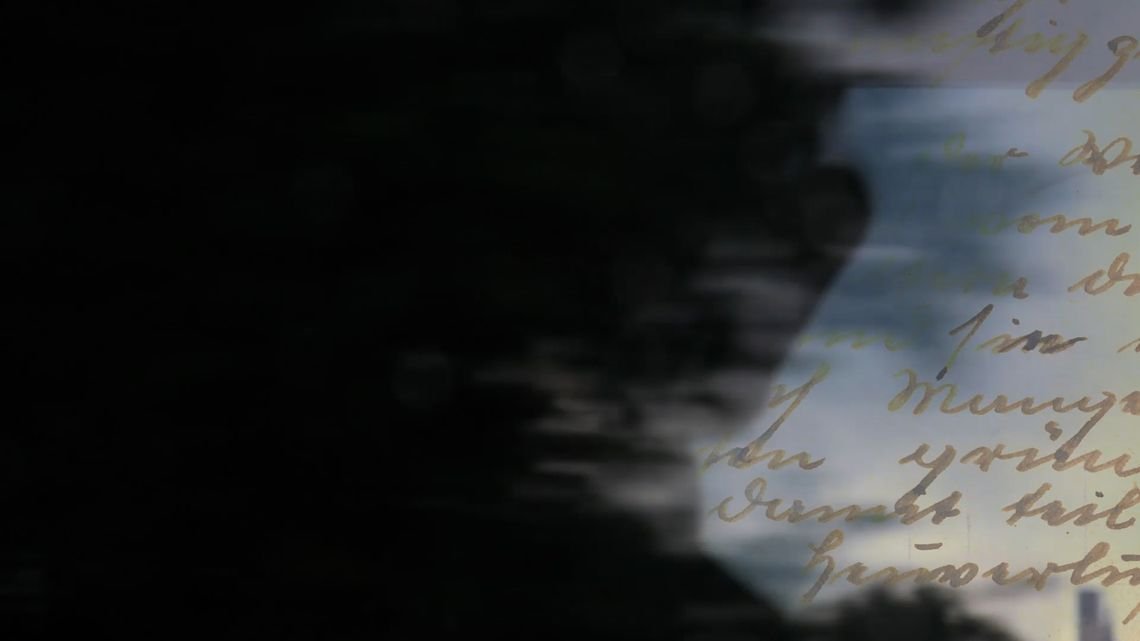A bit about “Questions for My Grandfather”
Reflections of my grandfather's diary and my reflection in the window of a moving train somewhere outside Frankfurt am Main, Germany. Still image from Questions For My Grandfather (2014)
There's a lot more that can be said about this project than will be said in this short post. The complex experience of my grandfather living as a half-Jewish person under the Third Reich deserves a whole book, which I may write one day. In many ways, this work is still ongoing for me– there are many loose ends that began for me by wandering around Germany following my grandfather's diary that I still want to tie up (and many more loose ends that will never be tied up). There are several people I met who forced me to reimagine the way I think about the world… In fact, I've already begun developing a possible documentary project as a kind of sequel to the work I began here, but that is all another post for another time… For now, I’ll just say how it all started.
_
It all started the summer after I had quit the Duke basketball team to pursue filmmaking, and I discovered my grandfather’s diary. I was looking for a project to do. And I had already heard stories passed down in my family about my grandfather’s life, but I had never met him (he passed away suddenly in 1985 of a heart attack). During the end of the World War II, and for years following, my grandfather had written in a diary, recorded daily events, emotions of the time, and other philosophical musings. The diary, though, had been written in an old German school-script called Sütterlin that was not legible to my family, who speaks little German (and certainly can not read and write in Sütterlin). So the diaries just ended up stored in boxes somewhere in my grandmother’s family archives. The diary had only existed as a myth in my own life, a hidden secret from a long-forgotten tale.
In that summer, though, something happened that would alter the course of my life: a close friend of my grandfather’s, Guenther Eisenhauer, decided to transcribe and translate the diary into English so that my family could read it. Guenther would later become the main subject of my research and the main driving force of the film. He would become for me one of the most important people in my life. Gis decision to help with the diary set in motion the entire project because that summer after I had left the Duke basketball team to focus on filmmaking, I found a printed copy of my grandfather’s diary, translated into English, sitting on our dining room table. I read it cover to cover in a few hours and sat in stunned silence.
It's difficult to describe just how impactful those few hours were on the course of my life. Here I was, a 19-year-old kid who had grown up and lived my whole childhood in North Carolina, and I was reading the diary of a half-Jewish man, my grandfather who I had never met, growing up during World War II halfway around the world. He was writing about daily events during a time when his father had been killed in Auschwitz, his sister had died because she was denied treatment by the Nazis, and he and his brother were taken to a labor camp in the Harz mountains outside of a town called Derenburg. History, and the globe itself, shrunk considerably in size that afternoon for me, and I was smacked over the head with a simple truth that all of us learn each in our own way, in our own time: our lives are intimately connected to the past. Just how connected, though, I was very much still learning.
I dedicated myself and my studies at Duke to understanding the words in the diary and understanding what my grandfather went through as a half-Jewish person. The diary was an amazing piece of first-hand knowledge, but it wasn't sufficient. It had large holes, many things left unsaid, many things that required context. I become obsessed with trying to fill these gaps in the diary, to truly understand what it must have been like to be my grandfather. And so I set off to Germany to spend as much time there, retracing the steps of the diary, to try to embody what it must have been like for my grandfather. I spent the better part of three years as an undergraduate trying to learn German, piece together primary sources, and draw from historical accounts to better understand the words in my grandfather's diary.
Ultimately, it left me with more questions than I had answers. And that's really what the movie is about. It's called, Questions For My Grandfather, and I dedicated the movie to my grandfather. I very much hope to be able to ask him many more still if/when we meet in an afterlife.
You can watch the film in full at the DDM Films streaming site: https://ddmfilms.vhx.tv/

